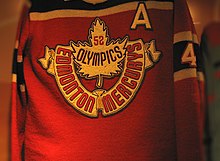
Back Hoquei sobre gel als Jocs Olímpics d'hivern de 1952 Catalan Lední hokej na Zimních olympijských hrách 1952 Czech Olympische Winterspiele 1952/Eishockey German Anexo:Hockey sobre hielo en los Juegos Olímpicos de Oslo 1952 Spanish Jäähoki 1952. aasta taliolümpiamängudel Estonian Jääkiekko talviolympialaisissa 1952 Finnish Hockey sur glace aux Jeux olympiques de 1952 French Jégkorong az 1952. évi téli olimpiai játékokon Hungarian Hockey su ghiaccio ai VI Giochi olimpici invernali Italian 1952年オスロオリンピックのアイスホッケー競技 Japanese
 Jersey of Canada's 1952 Olympic Gold Medal team, the Edmonton Mercurys | |
| Tournament details | |
|---|---|
| Host country | |
| Venue(s) | Jordal Amfi Arena, Dælenenga, Kadettangen, Marienlyst and Lillestrøm |
| Dates | 15–25 February 1952 |
| Teams | 9 |
| Final positions | |
| Champions | |
| Runner-up | |
| Third place | |
| Fourth place | |
| Tournament statistics | |
| Games played | 37 |
| Goals scored | 335 (9.05 per game) |
| Scoring leader(s) | |
The men's ice hockey tournament at the 1952 Winter Olympics in Oslo, Norway, was the seventh Olympic Championship, also serving as the 19th World Championships and the 30th European Championships. The tournament was mainly played at the Jordal Amfi Arena, as well as the stadiums at Dælenenga (in Oslo), Kadettangen (Sandvika), Marienlyst (Drammen) and Lillestrøm (Lillestrøm). Canada, represented by the Edmonton Mercurys, won its sixth Olympic gold medal and 15th World Championship. Highest finishing European team Sweden won the bronze medal and its sixth European Championship.[1]
The tournament was nearly not played at all. Discussions began in 1950, whether or not ice hockey would be included in the 1952 Winter Olympics. The International Olympic Committee (IOC) sought assurance that participating teams would adhere to its amateur code rather than the International Ice Hockey Federation (IIHF) code, and also wanted to exclude IIHF president Fritz Kraatz from negotiations. IIHF past-president W. G. Hardy, and secretary George Dudley agreed there would be no negotiations on those terms, nor would they repudiate Kraatz. Dudley expected the IIHF to discuss having its own 1952 Ice Hockey World Championships instead, and stated that the Olympics would be a financial failure without the inclusion of hockey.[2] In 1951 it was decided to drop hockey from the Olympic programme because of the controversies surrounding the 1948 Games. However, at the IOC congress in Romania the same year, it was reinstated.[3][4] W. G. Hardy advocated for the inclusion of the Soviet Union national ice hockey team, provided there is no political interference.[5] Despite his advocacy the Soviet authorities did not apply in time to be included in the tournament.[6][7]
Teams from Germany and Czechoslovakia rejoined the top level of international hockey this year. Nine nations played a round-robin with the top three nations receiving medals at the end.[3][4] Swiss newspapers criticized the rough play by Canada and the United States team, and questioned whether hockey should be part of the Olympics. Canadian Amateur Hockey Association president Doug Grimston felt the games were tame compared to North American standards and that the Olympics would suffer without hockey which was its biggest attraction.[8]
After Canada and the United States played to a draw in the final game of the round-robin, which placed the teams first and second respectively in the standings for the gold and silver medals. Had Canada won, the United States would have placed fourth. A newspaper in Moscow charged that a deal had been made to predetermine the outcome and assure the United States of a silver medal and to exclude the Czechoslovakia team from a medal.[9][10] Canada won their sixth Olympic title, and fifteenth World title. The USA finished one point ahead of both Sweden and Czechoslovakia who both finished with six wins and two losses, additionally, they had an equal goal differential of +29. The Czechoslovaks had defeated the Swedes four to nothing on the final day, and believed that they had won the Olympic bronze, and the European Championship. However, organizers decided that they should play a final tie-breaking game, in which the Swedes overcame a three-goal deficit to win five to three.[3][4]
- ^ "Ice Hockey at the 1952 Oslo Winter Games". Sports Reference. Archived from the original on 17 April 2020. Retrieved 13 May 2019.
- ^ "International Puck Bodies Widely Split". Winnipeg Free Press. Winnipeg, Manitoba. May 18, 1950. p. 17.

- ^ a b c Cite error: The named reference
passionwas invoked but never defined (see the help page). - ^ a b c Duplacey p. 503
- ^ "News Bulletins". Lethbridge Herald. Lethbridge, Alberta. January 15, 1952. p. 1.

- ^ Findling and Pelle (1996), pp. 254–255
- ^ US War Department (1952), pp. 11
- ^ "No Rowdyism Says I.I.H.F. Chief Kraatz". Lethbridge Herald. Lethbridge, Alberta. February 22, 1952. p. 18.

- ^ "U.S.-Canada Tie Rapped In Russia". Charleston Gazette. Charleston, West Virginia. February 28, 1952. p. 15.
 ; "Reds Suggest Fix Was On". Winnipeg Free Press. Winnipeg, Manitoba. February 28, 1952. p. 23.
; "Reds Suggest Fix Was On". Winnipeg Free Press. Winnipeg, Manitoba. February 28, 1952. p. 23.
- ^ "Canuck Pucksters May Not Enter Olympics Again". Fairbanks Daily News Miner. Fairbanks, Alaska. March 6, 1952. p. 2.
